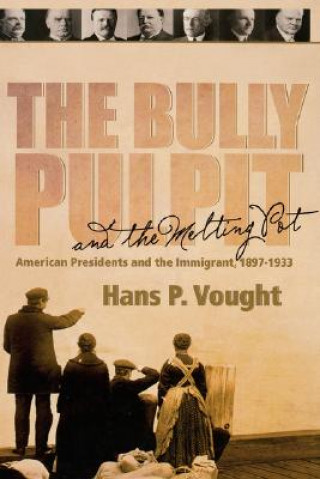
Kód: 02797814
Bully Pulpit and the Melting
Autor Hans P. Vought
Between 1897 and 1933 the presidents of the United States joined progressive reformers in redefining the concept of the United States as a "melting pot." Their use of this metaphor to describe assimilation never meant that immigra ... celý popis
- Jazyk:
 Angličtina
Angličtina - Vazba: Pevná
- Počet stran: 280
Nakladatelství: Mercer University Press, 2004
- Více informací o knize

1317 Kč
Dostupnost:
50 % šance Máme informaci, že by titul mohl být dostupný. Na základě vaší objednávky se ho pokusíme do 6 týdnů zajistit.
Máme informaci, že by titul mohl být dostupný. Na základě vaší objednávky se ho pokusíme do 6 týdnů zajistit.Prohledáme celý svět
Mohlo by se vám také líbit
-

Young Explorers 2 Sun, Cloud, Stone
131 Kč -

Solubility of Gases and Liquids
1681 Kč -

Taxation of Corporations and Shareholders
1681 Kč -

My Little Sister Doris
222 Kč -

RV Living Full Time
235 Kč -

Transformative and Engaging Leadership
1681 Kč -

Helgolandfahrt
539 Kč
Darujte tuto knihu ještě dnes
- Objednejte knihu a zvolte Zaslat jako dárek.
- Obratem obdržíte darovací poukaz na knihu, který můžete ihned předat obdarovanému.
- Knihu zašleme na adresu obdarovaného, o nic se nestaráte.
Informovat o naskladnění knihy
Zadejte do formuláře e-mailovou adresu a jakmile knihu naskladníme, zašleme vám o tom zprávu. Pohlídáme vše za vás.
Více informací o knize Bully Pulpit and the Melting
Nákupem získáte 132 bodů
 Anotace knihy
Anotace knihy
Between 1897 and 1933 the presidents of the United States joined progressive reformers in redefining the concept of the United States as a "melting pot." Their use of this metaphor to describe assimilation never meant that immigrants had to completely abandon their ethnic cultures. Instead, they argued that the "melting pot" blended the best of the immigrants" traits and traditions to create a new American "race" united by patriotism and committed to liberal political and economic ideals. While nativists regarded "new" immigrants from southern and eastern Europe as incapable of assimilation, the presidents celebrated immigrant contributions to America and emphasized the need to improve immigrants' lives through education, resettlement away from urban ghettoes, and economic uplift. The president's speeches, letters, and administrative records reveal consistent support for the "melting pot" model as an alternative to nativist racism. While McKinley, Roosevelt, Taft and Wilson supported the exclusion of racial aliens and those with mental or physical illness, they repeatedly praised the "new" immigrants for embracing American ideals while maintaining their ethnic cultures. They argued that everyone should be judged by their moral character rather than their ancestry. World War I raised fears of disloyal aliens that Roosevelt and Wilson heightened by denouncing "hyphenated Americans." Harding, Coolidge, and Hoover continued to use "melting pot" rhetoric, however, rather than endorsing coercive assimilation. The "melting pot" legacy lives on, and still offers a middle ground between the demands for national unity and multiculturalism.
 Parametry knihy
Parametry knihy
Zařazení knihy Knihy v angličtině Humanities History Regional & national history
1317 Kč
- Plný název: Bully Pulpit and the Melting
- Autor: Hans P. Vought
- Jazyk:
 Angličtina
Angličtina - Vazba: Pevná
- Počet stran: 280
- EAN: 9780865548879
- ISBN: 9780865548879
- ID: 02797814
- Nakladatelství: Mercer University Press
- Hmotnost: 558 g
- Rozměry: 236 × 164 × 27 mm
- Datum vydání: 01. December 2004
Oblíbené z jiného soudku
-

Hundred Years' War on Palestine
356 Kč -

Ethnic Cleansing of Palestine
378 Kč -

History of Japan
403 Kč -

Ten Myths About Israel
341 Kč -

Strange Death of Europe
433 Kč -

Decline and Fall of the Roman Empire
139 Kč -

Secret History
303 Kč -

God's Playground A History of Poland
1700 Kč -

Mayflower
388 Kč -

How to be a Victorian
302 Kč -

Plantagenets
357 Kč -

General's Son
424 Kč -

Iran: A Very Short Introduction
283 Kč -

Temples of Karnak
3798 Kč -

Cuneiform
276 Kč -

Twenty Years A-Growing
250 Kč -

China in Africa
906 Kč -

History of Witchcraft in England from 1558 to 1718
460 Kč -

Islandman
311 Kč -

Bohemian Paris
415 Kč -

Alexiad
427 Kč -

Lancaster And York
490 Kč -

Modern France: A Very Short Introduction
336 Kč -

Inside Hitler's Greece
518 Kč -

Diana: Her True Story - In Her Own Words
323 Kč -

The Fourth Turning
393 Kč -

The Oxford History of Ancient Egypt
384 Kč -

Churchill: The Power of Words
433 Kč -

Palestine
564 Kč -

Korean History in Maps
706 Kč -

Great Gatsby (Wisehouse Classics Edition)
406 Kč -

Viking Way
1267 Kč -

The Thirteenth Tribe
309 Kč -

My Promised Land
378 Kč -

Vanished Kingdoms
542 Kč -

Age Of Revolution
410 Kč -

Life and Death of Anne Boleyn
585 Kč -

Coming of the Third Reich
463 Kč -

Children of Ash and Elm
487 Kč -

Europe Between the Oceans
799 Kč -

Socialism Betrayed
478 Kč -

303 Squadron
463 Kč -

Ancient Celts, Second Edition
655 Kč -

Dancing in the Glory of Monsters
396 Kč -

Battle of Britain: Luftwaffe Blitz (Images of War)
606 Kč -

Age of Confucian Rule
851 Kč -

Beyond Band of Brothers
410 Kč -

Benjamin Franklin
460 Kč -

On China
487 Kč
Osobní odběr Praha, Brno a 12903 dalších
Copyright ©2008-24 nejlevnejsi-knihy.cz Všechna práva vyhrazenaSoukromíCookies


 Vrácení do měsíce
Vrácení do měsíce 571 999 099 (8-15.30h)
571 999 099 (8-15.30h)